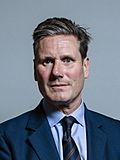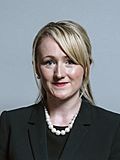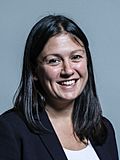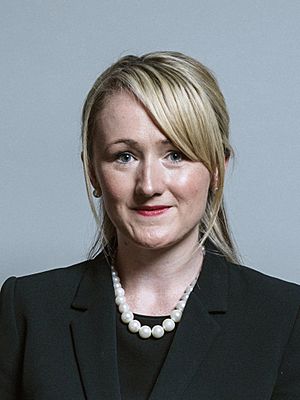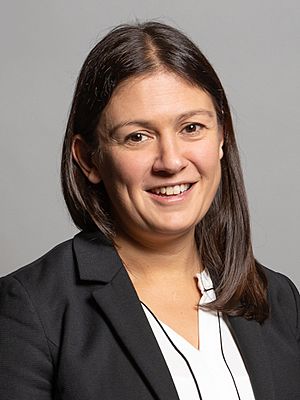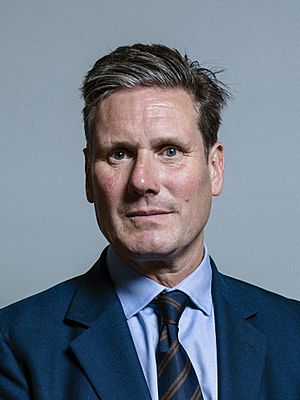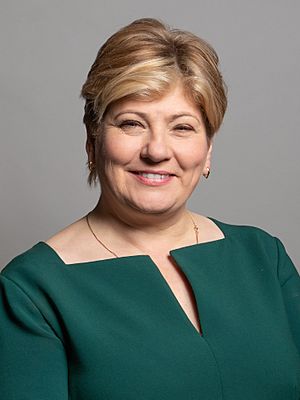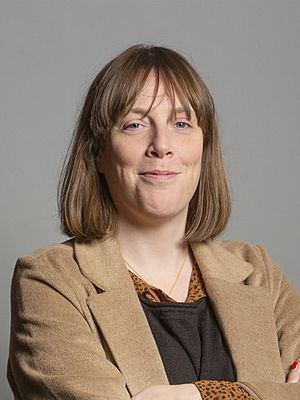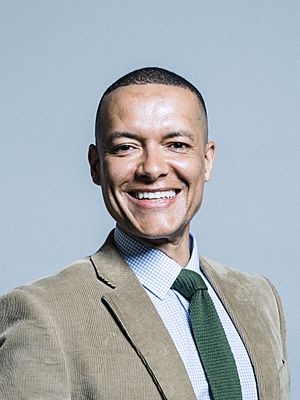2020 Labour Party leadership election facts for kids
|
|||||||||||||||||
| Turnout | 490,731 (62.58%) | ||||||||||||||||
|---|---|---|---|---|---|---|---|---|---|---|---|---|---|---|---|---|---|
|
|||||||||||||||||
|
|||||||||||||||||
The 2020 Labour Party leadership election was a special vote held by the Labour Party in the United Kingdom. It took place between February 21 and April 4, 2020. The purpose was to choose a new leader for the party.
This election happened because the previous leader, Jeremy Corbyn, decided to step down. He announced this on December 13, 2019, after the Labour Party did not win many seats in the general election that year.
Keir Starmer won the election. He received 56.2% of the votes in the first round. This leadership election happened at the same time as the vote for the party's deputy leader.
Contents
Why the Election Happened
Jeremy Corbyn became the leader of the Labour Party in 2015. He was re-elected in 2016 after another vote. In the 2017 general election, Labour gained some seats. However, in the 2019 election, the party lost 60 seats. This was their worst result since the 1935 general election. After this, Corbyn said he would resign.
Important Dates for the Election
The Labour Party's main committee, called the National Executive Committee, set the dates for the election on January 6, 2020.
- January 7: Members of Parliament (MPs) and Members of the European Parliament (MEPs) could start nominating candidates.
- January 13: Nominations from MPs and MEPs closed.
- January 15: Local Labour Party groups (CLPs) and other groups linked to the party could start nominating candidates.
- January 20: This was the last day for people to join the party to be able to vote.
- February 14: Nominations from local groups and linked organizations closed.
- February 21: Voting began for party members.
- April 2: Voting ended.
- April 4: The winner was announced.
Who Ran for Leader
Several people put their names forward to become the new leader. Here are the main candidates who officially ran:
Candidates Who Made It to the Final Vote
* Rebecca Long-Bailey was a Member of Parliament (MP) for Salford and Eccles since 2015. She was also the Shadow Business Secretary. She announced she was running on January 6, 2020.
* Lisa Nandy has been an MP for Wigan since 2010. She announced her campaign on January 4, 2020.
* Keir Starmer has been an MP for Holborn and St Pancras since 2015. He was also the Shadow Brexit Secretary. He announced his campaign on January 4, 2020.
Candidates Who Were Eliminated or Withdrew
Some candidates started the race but did not make it to the final vote.
* Emily Thornberry was an MP for Islington South and Finsbury since 2005. She was eliminated from the race on February 14, 2020.
* Jess Phillips was an MP for Birmingham Yardley since 2015. She withdrew from the election on January 21, 2020.
* Clive Lewis was an MP for Norwich South since 2015. He withdrew from the election on January 13, 2020.
People Who Decided Not to Run
Some well-known Labour politicians were thought to be possible candidates but chose not to run. These included:
- Diane Abbott, who was the Shadow Home Secretary.
- Yvette Cooper, who leads an important committee in Parliament.
- John McDonnell, who was the Shadow Chancellor (in charge of money matters).
- Angela Rayner, who was the Shadow Education Secretary. She decided to run for Deputy Leader instead.
How Candidates Got Nominated
To become an official candidate, people first needed support from other Labour MPs and MEPs (Members of the European Parliament). They needed at least 10% of these politicians to nominate them.
After that, candidates needed more support from either:
- At least 5% of local Labour Party groups (called CLPs).
- Or, at least three groups linked to the Labour Party, including at least two trade unions. These groups together had to represent at least 5% of all members.
Here's a quick look at how many nominations the main candidates received:
- Keir Starmer received the most nominations from MPs, MEPs, local groups, and other linked organizations.
- Rebecca Long-Bailey also received enough nominations from all three groups.
- Lisa Nandy received enough nominations from MPs, MEPs, local groups, and other linked organizations.
- Emily Thornberry received enough nominations from MPs and MEPs, but not enough from local groups or other linked organizations, so she was eliminated.
- Jess Phillips received enough nominations from MPs and MEPs but withdrew before getting enough from local groups.
- Clive Lewis did not receive enough nominations from MPs and MEPs and withdrew early.
Election Timeline
| Candidate status | |
|---|---|
| Nominated candidate | |
| Eliminated candidate | |
| Withdrawn candidate | |
| Events | |
| Corbyn announces his resignation | |
| Nominations from the PLP and EPLP close | |
| First leadership hustings | |
| Nominations from CLPs and affiliates close | |
| Membership ballot opens | |
| Membership ballot closes | |
| Result announced | |
Timeline generation failed: 3 errors found
Line 30: from:06/01/2020 till:09/02/2026 color:Active text:"[[Rebecca Long-Bailey|Long-Bailey]]"
- Plotdata attribute 'till' invalid.
Date '09/02/2026' not within range as specified by command Period.
Line 32: from:03/01/2020 till:09/02/2026 color:Active text:"[[Lisa Nandy|Nandy]]"
- Plotdata attribute 'till' invalid.
Date '09/02/2026' not within range as specified by command Period.
Line 34: from:04/01/2020 till:09/02/2026 color:Active text:"[[Keir Starmer|Starmer]]"
- Plotdata attribute 'till' invalid.
Date '09/02/2026' not within range as specified by command Period.
Images for kids
 | Dorothy Vaughan |
 | Charles Henry Turner |
 | Hildrus Poindexter |
 | Henry Cecil McBay |


